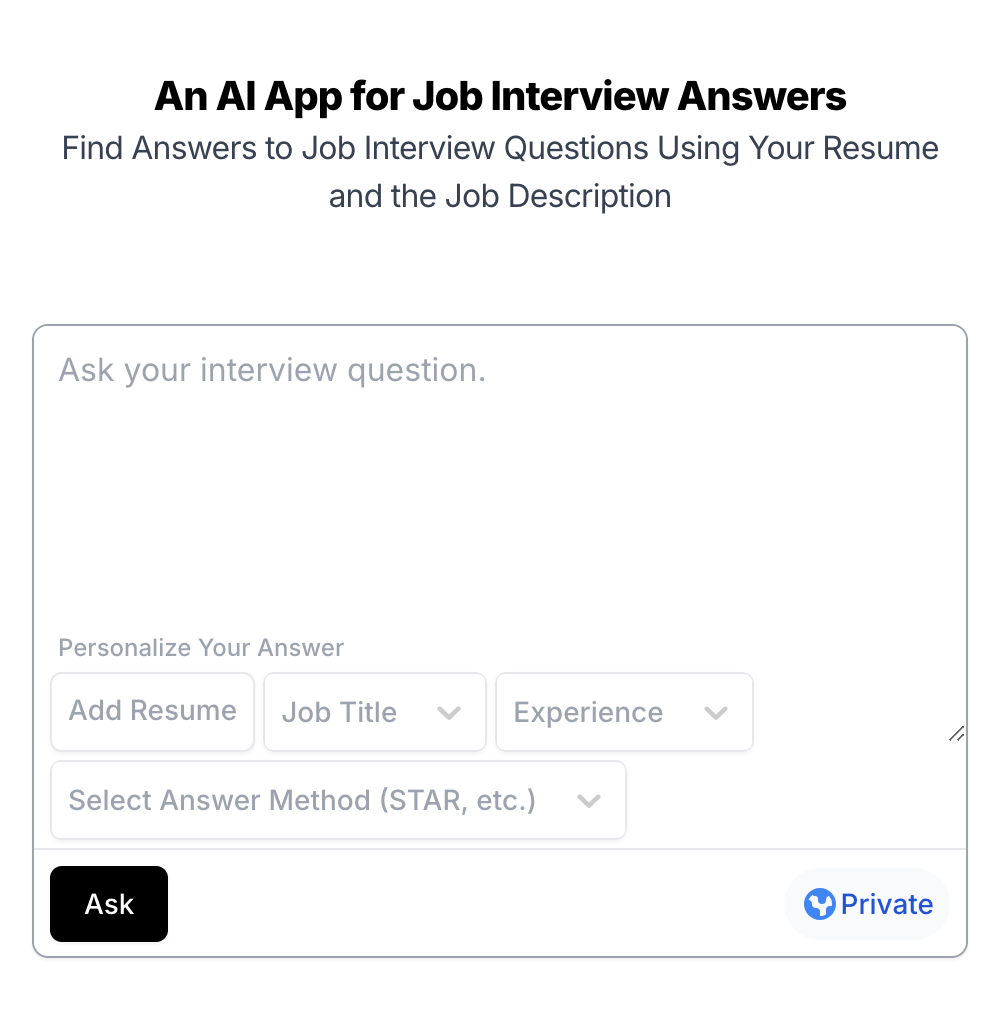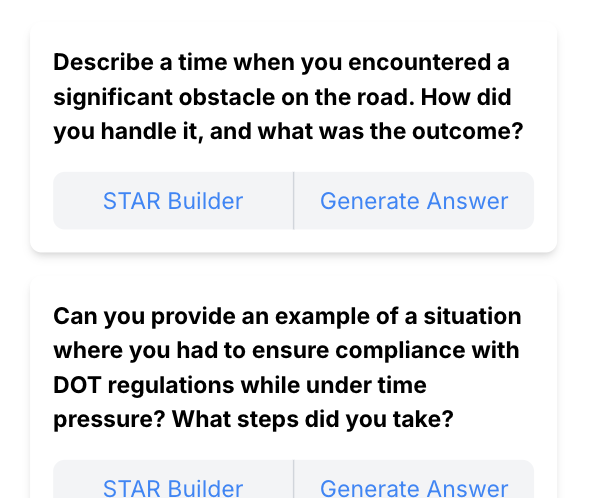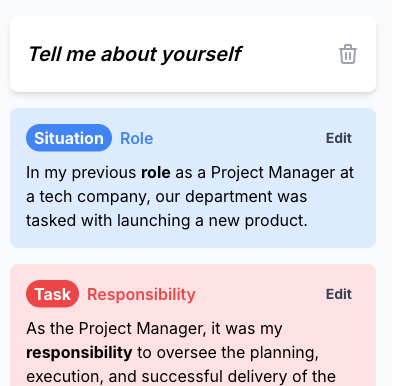
Cultural Fit Interview Questions: What You Need to Know
Fri Aug 23 2024•Author: InterviewPro AI
Table of Contents
- What Are They?
- Common Examples
- Answer Length
- What to Avoid Saying
- Possible Follow-Ups
- More Follow-Up Questions
- When They're Asked
- Who Asks Them
- Why They Matter
- How to Answer Well
- Answer Structure
What Are They?
Cultural fit questions assess how well you align with a company's values, work style, and environment. Employers use them to see if you'd work well with their team and thrive in their workplace. They want to know if your personality and work preferences match their company culture.
5 Common Examples
- How do you prefer to communicate with your colleagues?
- What type of work environment helps you perform your best?
- How do you handle conflicts with coworkers?
- What motivates you to do your best work?
- How do you feel about working in a team versus independently?
Answer Length
Aim to keep your answer to about 1-2 minutes. This gives you enough time to explain your preferences and experiences without going off-topic. Your answer shows how you'd fit into the company, so keep it focused and relevant.
What to Avoid Saying
Don't say these things when answering cultural fit questions:
-
Don't be overly negative about past employers Bad example: "My last company's culture was terrible. Everyone was so lazy." Why it's bad: This makes you seem difficult to work with or overly critical.
-
Don't say you can adapt to any culture Bad example: "I can fit in anywhere. I don't have any preferences." Why it's bad: This suggests you lack self-awareness or strong work values.
-
Don't lie about your preferences Bad example: "I love open offices!" (when you actually prefer quiet, private spaces) Why it's bad: If hired, you might struggle in an environment that doesn't suit you.
-
Don't focus solely on perks Bad example: "I'm looking for a company with great happy hours and free food." Why it's bad: This makes it seem like you care more about benefits than the work itself.
-
Don't be inflexible Bad example: "I only work well in environments exactly like my last job." Why it's bad: This suggests you might have trouble adapting to new situations.
-
Don't give vague answers Bad example: "I just want a good culture." Why it's bad: This doesn't show that you've thought about what you need in a workplace.
-
Don't contradict the company's known culture Bad example: "I hate collaborative work" (when applying to a company known for teamwork) Why it's bad: This shows you haven't researched the company or might not fit in.
Show that you've thought about your work preferences and how they align with the company's culture.
Possible Follow-Ups
After you answer, the interviewer might ask more about your cultural preferences. They could ask about:
-
Specific examples: They might want to hear about times you've thrived in similar cultures. Example: "Can you tell me about a time when you worked in an environment similar to ours?"
-
Challenges: They could ask how you'd handle aspects of their culture that might be new to you. Example: "Our company has a flat hierarchy. How would you adapt to that?"
-
Values: They might dig deeper into how your personal values align with the company's. Example: "One of our core values is innovation. How do you incorporate innovation into your work?"
-
Work style: They could ask more about how you prefer to work day-to-day. Example: "You mentioned you like collaborative environments. How do you balance teamwork with individual tasks?"
-
Growth: They might ask how you see yourself developing within their culture. Example: "How do you think our company culture could help you grow professionally?"
-
Conflict resolution: They could ask how you'd handle disagreements in their specific environment. Example: "In our open office, how would you address a conflict with a coworker?"
5 More Follow-Up Questions
- "How do you stay motivated in a fast-paced environment?"
- "What role do you usually take in team projects?"
- "How do you handle constructive criticism?"
- "What does work-life balance mean to you?"
- "How do you prefer to receive recognition for your work?"
When They're Asked
You might hear these questions at different stages:
-
Initial Screening: You might get basic cultural fit questions to see if it's worth continuing. Example: "What type of company culture are you looking for?"
-
First Interview: This is when you'll probably get most cultural fit questions, mixed with other types. Example: "How do you feel about our company's mission?"
-
Later Interviews: You might get more specific questions about fitting into the team or department. Example: "How would you contribute to our team's collaborative atmosphere?"
-
Final Stages: They might ask how you'd handle specific cultural scenarios. Example: "We often have last-minute projects. How would you manage your workload in this situation?"
-
Team Interviews: Different team members might ask about working together. Example: "How do you prefer to communicate with team members on projects?"
These questions can come up at any time, depending on how much the company values cultural fit.
Who Asks Them
-
HR People: Example: "How do you feel about our company's diversity initiatives?"
-
Hiring Managers: Example: "What management style do you work best under?"
-
Team Leaders: Example: "How do you handle tight deadlines and high-pressure situations?"
-
Potential Coworkers: Example: "What's your ideal team dynamic?"
-
Top Managers: Example: "How do you see yourself contributing to our company culture?"
-
Outside Recruiters: Example: "What type of company culture are you looking for in your next role?"
The person asking usually focuses on aspects of culture that matter most to their role or the company.
Why They Matter
These questions help employers see if you'd be happy and successful in their workplace. They show how well you'd fit with the team and company values. Employers use these questions to guess how likely you are to stay with the company long-term and how well you'd perform in their specific environment.
How to Answer Well
- Research the company's culture before the interview
- Be honest about your preferences
- Use specific examples from past experiences
- Show how your work style aligns with their culture
- Express enthusiasm for aspects of their culture that genuinely appeal to you
Answer Structure
Use this plan to organize your thoughts:
- State your preference: Briefly describe your ideal work environment
- Give an example: Share a time when you thrived in a similar culture
- Connect to the company: Explain how this aligns with what you know about their culture
- Show flexibility: Mention how you can adapt to new aspects of their environment
Cultural fit questions let you show how well you'd mesh with the company. Use them to demonstrate why you'd be a great addition to their team. Your answer helps employers see how you'd contribute to their workplace, so focus on showing genuine enthusiasm for their culture and how you'd thrive there.
Can't find what you're looking for?
Try our AI-Powered Interview Preparation Tools
Prepare for your job interview with our AI tools. Tailored answers, custom questions, and STAR method responses.


